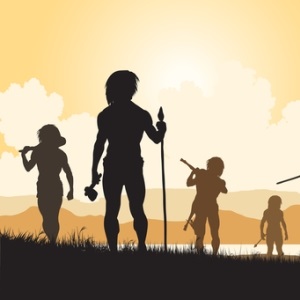
The word “Paleo” is short for “Paleolithic”, which refers to the earliest period of human development, starting about two million years ago and ending between 40 000 and 10 000 years ago. During this period our ancestors lived nomadic lives as hunter-gatherers.
Hunter-gatherers were healthier
By the end of the Paleolithic era, our ancestors started growing crops and domesticating animals, which supplied them with a sustainable source of food and enabled them to live in permanent, organised settlements.
A safer, more settled life and a secure source of food led to social advances, population growth and the emergence of modern civilisation as we know it. However, this sudden departure from a diet that was followed for more than a million years took its toll, and a comparison between skeletal remains of hunter-gatherers and early agriculturalists shows that the former were considerably healthier than the latter.
This reason is that hunting and gathering produced a more varied and nutritious diet and did not rely on foods like grains as a staple. Another argument is that in evolutionary terms it was not possible for the human body to adapt to a radical change in diet within such a short period of time.
The modern Paleo diet
The Paleo diet – also known as the caveman diet or Stone Age diet – is a modern emulation of our hunter-gatherer forefathers’ diet, using foods that are available in the 21st century. This means that foods that were not available 12 000 years ago should be shunned.
Proponents of this way of eating argue that modern humans are genetically not adapted to eating “modern” foods like grains and legumes, dairy products, refined sugar and processed oils, and that we are still best adapted to eating the diet of our Paleolithic ancestors.
Besides grains, dairy and oils that have been part of our diet for a while, there are three new factors that have emerged:
- Refined sugar is a relative newcomer. Worldwide, sugar consumption has risen from almost zero to around 23 kg per capita per annum in a just few centuries.
- Trans fat from hydrogenised vegetable oils has been part of our diet for less than a century.
- Chemical additives and processed foods also only appeared during the twentieth century.
How to eat the Paleo way
- More meat and fat. In accordance with our hunter-gatherer forefathers, about 20 to 35 percent of our calories should come from animal products. (Dairy products are excluded.)
- Less carbs: Non-starchy fresh fruits and vegetables should provide most of our daily calories and be our main source of carbohydrates. (Note that grains are excluded.)
- Increased fibre: Fibre in the diet has many advantages like cancer protection, and should be obtained through non-starchy fruits and vegetables.
The pros
The main advantage of the Paleo diet is that you eat unprocessed foods that are rich in nutrients and contain healthy fats – and you are likely to enjoy at least some of the following benefits:
- More energy
- Better sleep
- Clearer thinking
- Improved mood and less depression and anxiety
- Improved digestion
- Weight loss
- Better fitness levels
- Reduced risk of cancer, heart disease, diabetes, asthma
- Reduced inflammation
The cons
The main disadvantage of the Paleo diet is that it is very restrictive, which makes strict adherence a challenge. The question on many people’s lips is also if it is really necessary to cut out all grains. The high consumption of animal protein is also a concern to environmentalists. Equally problematic are the many studies that found that vegetarians and vegans tend to be healthier and live longer than meat eaters.
Read more:
The healthy hunter-gatherer
Paleo diet - is it worth the switch?
Paleo diet: not a diet of logic




 Publications
Publications
 Partners
Partners














